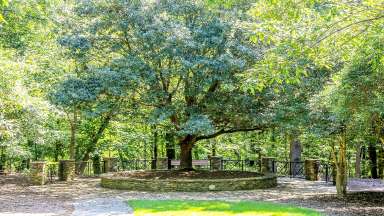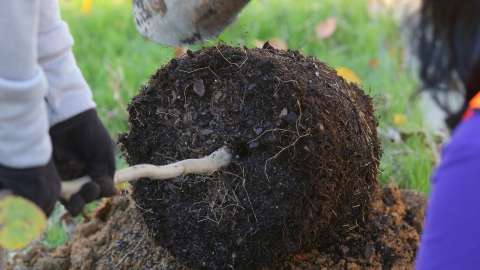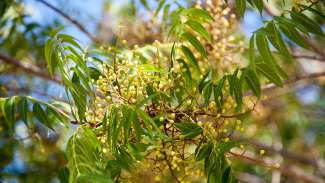Jump To:
Donor Tree Program Guidelines
- Our best effort will be made to plant the tree in your desired location; however, Raleigh Parks, Recreation and Cultural Resources reserves the right to determine the final location, the appropriateness of the species, and the costs associated with the planting.
- Trees will be chosen based on site conditions such as soil composition, soil moisture, light availability and distance to surrounding infrastructure. Trees proposed for an honor planting must be selected from the approved list of species.
- The final location will be determined at the discretion of the Urban Forester. Trees must be planted on municipal land. For the purpose of this policy, municipal land means any city-owned, maintained, and/or controlled property.
- Raleigh Parks, Recreation and Cultural Resources cannot guarantee that a Donor Tree will not be removed in the event that a Park Master Plan or other construction dictates landscape changes.
- Donor trees will become City of Raleigh property and therefore we will be responsible for all care and maintenance.
- Following the submission of the request form, a City of Raleigh Parks, Recreation and Cultural Resources Arborist will assess the proposed site and make a decision on the proper species, size, and site. The applicant will be contacted to finalize arrangements.
- Raleigh Parks, Recreation and Cultural Resources will put forth its best effort to ensure that the donor tree is properly maintained during the period of establishment. We cannot, however, insure the tree against acts of vandalism or failure as a result of environmental conditions.
- Raleigh Parks, Recreation and Cultural Resources will provide one replacement donor tree within 1 year of initial planting, at or near the original planting site, at no cost to the applicant. We will attempt to replace the tree with the same size and species; however, we reserve the right to plant an alternative species and/or size.
- Donor trees will be planted by the Raleigh Parks, Recreation and Cultural Resources staff in the spring and fall seasons. To receive consideration for spring planting, a request form must be received no later than February 10. To receive consideration for fall planting, a request form must be received no later than September 10.
- All donor trees will come with a Certificate of Authenticity containing the following information: tree species, general description of where the tree was planted, acknowledgment of the person being honored, and date of the tree planting.
- A copy of the tree planting certificate will be on file in the Parks, Recreation and Cultural Resources Department for future reference. In addition, a comprehensive list of all donor trees with the location and name of the honoree will be maintained.
List of Approved Species
| Small to Medium Maturing | Large Maturing |
|---|---|
|
Serviceberry - Amelanchier grandiflora A deciduous small tree with attractive white spring blossoms. This tree provides year-round interest in the landscape Eastern Dogwood - Cornus florida This tree has beautiful white blossoms and is native to North Carolina. Native Fringetree - Chionanthus virginicus Also called “Old Mans Beard” because of its showy and delicately fragrant white flowers Chinese Fringetree - Chionanthus retusis Pure white fragrant flowers hang four inches long and appear to cover the tree with snowy white cotton. Japanese Snowbell - Styrax japonicus Leaves are perched on the ends of the stems so as to show off the white bell- shaped blooms. Witchhazel - Hamamelis virginiana In the fall, leaves turn a gorgeous yellow and fragrant yellow flowers bloom. Eastern Redbud - Cercis canadensis This tree features showy magenta flowers in the summer and dark red buds in the winter. Silverbell - Halesia tetraptera One of the best native trees for shady habitats. White Bell- shaped flowers emerge in April and persist for 2 weeks. Flowering Cherry - Prunus spp. These trees are valued for latticed bark and showy blooms in the spring. Saucer Magnolia - Magnolia soulangiana Fuzzy green buds in winter and bright white blossoms, with a pink center, in the summer. |
Oak tree - Quercus A wonderful tribute in “The City of Oaks”, we offer many varieties. Red Maple - Acer rubrum The leaves turn a vibrant shade of red in the fall. Southern Magnolia - Magnolia grandiflora This tree has large beautiful white aromatic flowers. Tupelo - Nyssa sylvatica The nectar of these flowering trees is prized by beekeepers and its brilliant red fall color makes it appealing to everyone. Princeton Sentry Elm - Ulmus Americana ‘Princeton’ In cultivation since the 1920s, these shade trees are self-pruning and ideal for street plantings. Ginkgo - Ginkgo biloba Its Latin name means “living fossil”. This species dates back 270 million years. |
*Other species may be considered
Donor Tree Program Request Form
With a donation, Raleigh Parks, Recreation and Cultural Resources will plant a tree on municipal lands in honor or in memory of your loved one, friend, or co-worker. This tree will serve as a living and growing memorial while helping Raleigh Parks, Recreation and Cultural Resources continue to create a healthier more sustainable Raleigh. All trees are purchased via donations.
We will send a personalized card to inform recipients that you have made a gift to plant a tree in their name.


